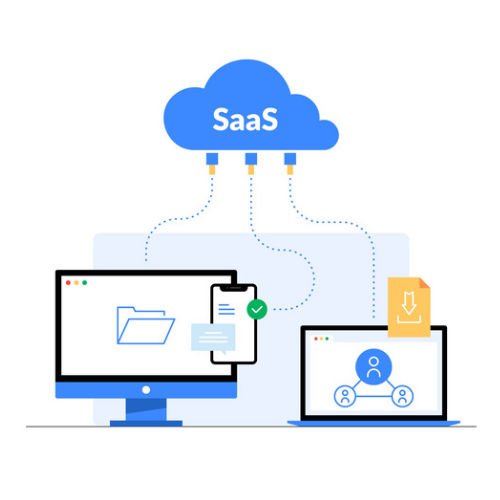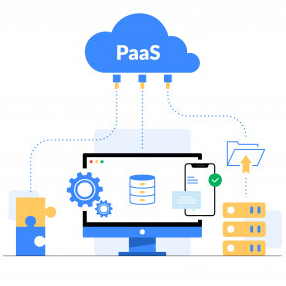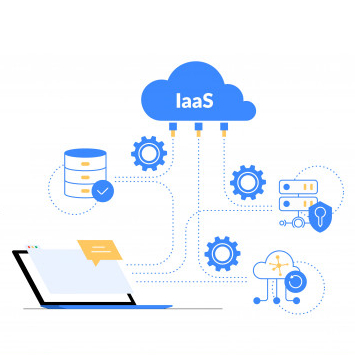
- Cloud Service Model Adoption – SaaS, PaaS and IaaS
- Cloud Consulting
- Cloud Infrastructure Monitoring
- Cloud Infrastructure Security
The future of computing is in the cloud. Once you sign up for cloud service models SaaS, IaaS, PaaS, you can leverage its wider possibilities to bring the flexibility and efficiency that pushes your business growth.
Advantages of adopting a cloud service into your enterprise are as follows,
Cloud Service Model adoption – SaaS, PaaS and IaaS
SaaS
Software as a service (SaaS) is a cloud computing offering that provides users with access to a vendor’s cloud-based software. Users do not install applications on their local devices. Instead, the applications reside on a remote cloud network accessed through the web or an API. Through the application, users can store and analyze data and collaborate on projects.
Key Features
- SaaS vendors provide users with software and applications via a subscription model.
- Users do not have to manage, install or upgrade software; SaaS providers manage this.
- Data is secure in the cloud; equipment failure does not result in loss of data.
- Use of resources can be scaled depending on service needs.
- Applications are accessible from almost any internet-connected device, from virtually anywhere in the world.


PaaS
Platform as a service (PaaS) is a cloud computing offering that provides users with a cloud environment in which they can develop, manage and deliver applications. In addition to storage and other computing resources, users are able to use a suite of prebuilt tools to develop, customize and test their own applications.
Key Features
- PaaS provides a platform with tools to test, develop and host applications in the same environment.
- Enables organizations to focus on development without having to worry about underlying infrastructure.
- Providers manage security, operating systems, server software and backups.
- Facilitates collaborative work even if teams work remotely.
IaaS
Infrastructure-as-a-Service (IaaS) is a cloud-computing offering in which a vendor provides users access to computing resources such as servers, storage and networking. Organizations use their own platforms and applications within a service provider’s infrastructure.
Key features
- Instead of purchasing hardware outright, users pay for IaaS on demand.
- Infrastructure is scalable depending on processing and storage needs.
- Saves enterprises the costs of buying and maintaining their own hardware.
- Because data is on the cloud, there can be no single point of failure.
- Enables the virtualization of administrative tasks, freeing up time for other work.

Cloud Consulting
Hedges helps organizations transform their IT environment with best-in-class Cloud Computing Services. Our team of experts delivers highly-effective and reliable cloud computing services that provide organizations with a competitive edge.
Our cloud solutions enable organizations to reduce IT resource requirements and improve productivity, in addition to lowering costs and reducing the time-to-market.
We assist customers with our on-demand delivery of computing services, tools and applications such as servers, storage, databases, networking, software, apps, among others.
By enabling organizations for cloud adoption, we help them become more agile and responsive to the changing market landscape, thus supporting them in the right decision-making and maximizing their Return on Investment (ROI).
Cloud infrastructure monitoring
Cloud infrastructure monitoring software allows companies to visualize and track the performance of their cloud applications or services. These tools aggregate data in real time to display information related to a company’s cloud-based resources.
Cloud monitoring is the process of reviewing and managing the operational workflow and processes within a cloud infrastructure or asset. It’s generally implemented through automated monitoring software that gives central access and control over the cloud infrastructure.
Admins can review the operational status and health of cloud servers and components.
Concerns arise based on the type of cloud structure you have, and your strategy for using it. If you’re using a public cloud service, you tend to have limited control and visibility for managing and monitoring the infrastructure. A private cloud, which most large organizations use, provides the internal IT department more control and flexibility, with added consumption benefits.
Regardless of the type of cloud structure your company uses, monitoring is critical to performance and security.
Cloud infrastructure security
Cloud security—also called cloud computing security—refers to the discipline and practice of protecting cloud computing environments, applications, data, and information. Cloud security entails securing cloud environments against unauthorized use/access, distributed denial of service (DDOS) attacks, hackers, malware, and other risks. While cloud security applies to security for cloud environments, the related term, cloud-based security, refers to the software as a service (SaaS) delivery model of security services, which are hosted in the cloud rather than deployed via on-premise hardware or software.